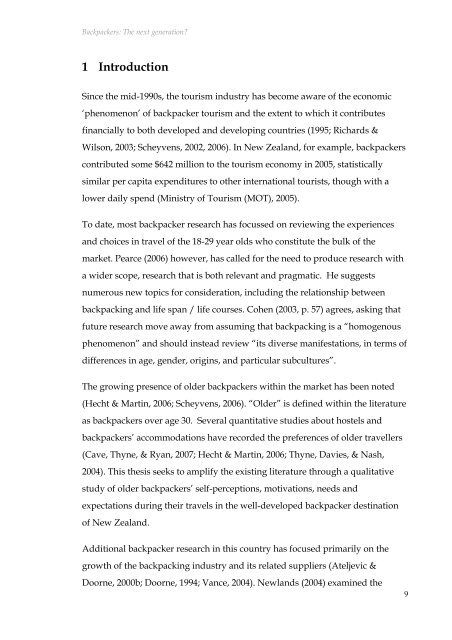Backpackers: The next generation? - Scholarly Commons Home
Backpackers: The next generation? - Scholarly Commons Home
Backpackers: The next generation? - Scholarly Commons Home
Create successful ePaper yourself
Turn your PDF publications into a flip-book with our unique Google optimized e-Paper software.
<strong>Backpackers</strong>: <strong>The</strong> <strong>next</strong> <strong>generation</strong>?<br />
1 Introduction<br />
Since the mid-1990s, the tourism industry has become aware of the economic<br />
‘phenomenon’ of backpacker tourism and the extent to which it contributes<br />
financially to both developed and developing countries (1995; Richards &<br />
Wilson, 2003; Scheyvens, 2002, 2006). In New Zealand, for example, backpackers<br />
contributed some $642 million to the tourism economy in 2005, statistically<br />
similar per capita expenditures to other international tourists, though with a<br />
lower daily spend (Ministry of Tourism (MOT), 2005).<br />
To date, most backpacker research has focussed on reviewing the experiences<br />
and choices in travel of the 18-29 year olds who constitute the bulk of the<br />
market. Pearce (2006) however, has called for the need to produce research with<br />
a wider scope, research that is both relevant and pragmatic. He suggests<br />
numerous new topics for consideration, including the relationship between<br />
backpacking and life span / life courses. Cohen (2003, p. 57) agrees, asking that<br />
future research move away from assuming that backpacking is a “homogenous<br />
phenomenon” and should instead review “its diverse manifestations, in terms of<br />
differences in age, gender, origins, and particular subcultures”.<br />
<strong>The</strong> growing presence of older backpackers within the market has been noted<br />
(Hecht & Martin, 2006; Scheyvens, 2006). “Older” is defined within the literature<br />
as backpackers over age 30. Several quantitative studies about hostels and<br />
backpackers’ accommodations have recorded the preferences of older travellers<br />
(Cave, Thyne, & Ryan, 2007; Hecht & Martin, 2006; Thyne, Davies, & Nash,<br />
2004). This thesis seeks to amplify the existing literature through a qualitative<br />
study of older backpackers’ self-perceptions, motivations, needs and<br />
expectations during their travels in the well-developed backpacker destination<br />
of New Zealand.<br />
Additional backpacker research in this country has focused primarily on the<br />
growth of the backpacking industry and its related suppliers (Ateljevic &<br />
Doorne, 2000b; Doorne, 1994; Vance, 2004). Newlands (2004) examined the<br />
9

















